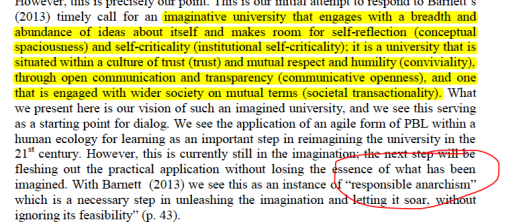To get into the ‘Problem Based Learning’ thinking I was reading up on some of the course literature. This article I found particularly fascinating:
Kek, M. & Huijser, H. (2015). 21st century skills: problem based learning and the University of the Future. Paper Third 21st Century Academic Forum Conference, Harvard, Boston, USA.
In this article, a number of aspects stands out to me. For one:

The concept of using your MIND (what’s the idea), your HEART (where is the passion) and the ACTION (what are we going to do) I have frequently used in…elevator pitches! Teaching students to make a good impression on an important researchers in their field, asking for a guest lecture of visit to their institution, getting the person involved in your project. But thinking about this concept in the ONL context makes a lot of sense now. It is about having something to say (backed up by -technical- knowledge), being engaged into it and then expecting something to happen, a result to appear a communication to start. Learning online, with the help of a network, based on a specific challenge is thus not so different from an elevator pitch where you are trying to sell your project to somebody you respect and expect a ‘click’, an active communication, an exchange of information.
Another part which interested me a lot in this article was:

How to be creative and productive, given many uncertainties. Almost all engineers are trained within a pillar structure. Which serves a purpose as ‘general knowledge’ will not build a house, get an airplane to fly or solve urban problems. Yet how to use your technical skills and knowledge and combine them with many other skills and abilities within an uncertain situation is getting us into adaptive engineering. But we are not even thinking specifically about engineering here, we are thinking about learning, education and the supporting system around it. Provided that we allow our students to use learn in different ways then we are traditionally used to, how can we still ensure the outcome? If we let ‘the internet’ be part of the research domain, how to we avoid concluding assignement which are a simple ‘googled-piece of art’? I have found this very tough to establish as a teacher. Not merely the motivation, but the entire guiding mechanism, and criteria based -pass te course based on xyz’ is not catering for this.
So what is the solution? Well the article gives another idea on this:

I thoroughly like the idea of ‘responsible anarchism’ as a beautiful contradiction to itself. I think that designing a course on solid educational principles and getting students to learn their important lessons ‘problem-base’-wise may not even be the main challenge here. Getting the universities and the mind-sets of the teachers reprogrammed may be even a larger problem…

Getting the universities and the mind-sets of the teachers reprogrammed may be even a larger problem…
and a lovely problem to solve…together don’t you think?
LikeLike
I also found the last sentence most interesting. And yes, it will be a real challenge. However, there is one major difference compared to other areas where we try to change mindsets and habits of our teachers: our students are already changing theirs. In other areas (e.g., type of examination), the students are often the ones clinging most to the tradition, but in this case, we already experience that students have watched an MIT lecture on the topic before coming to the KTH lecture and they are more and more already prepared for, and also expecting more from, the lecture. The expectations from the students will give a powerful momentum to the change.
LikeLike